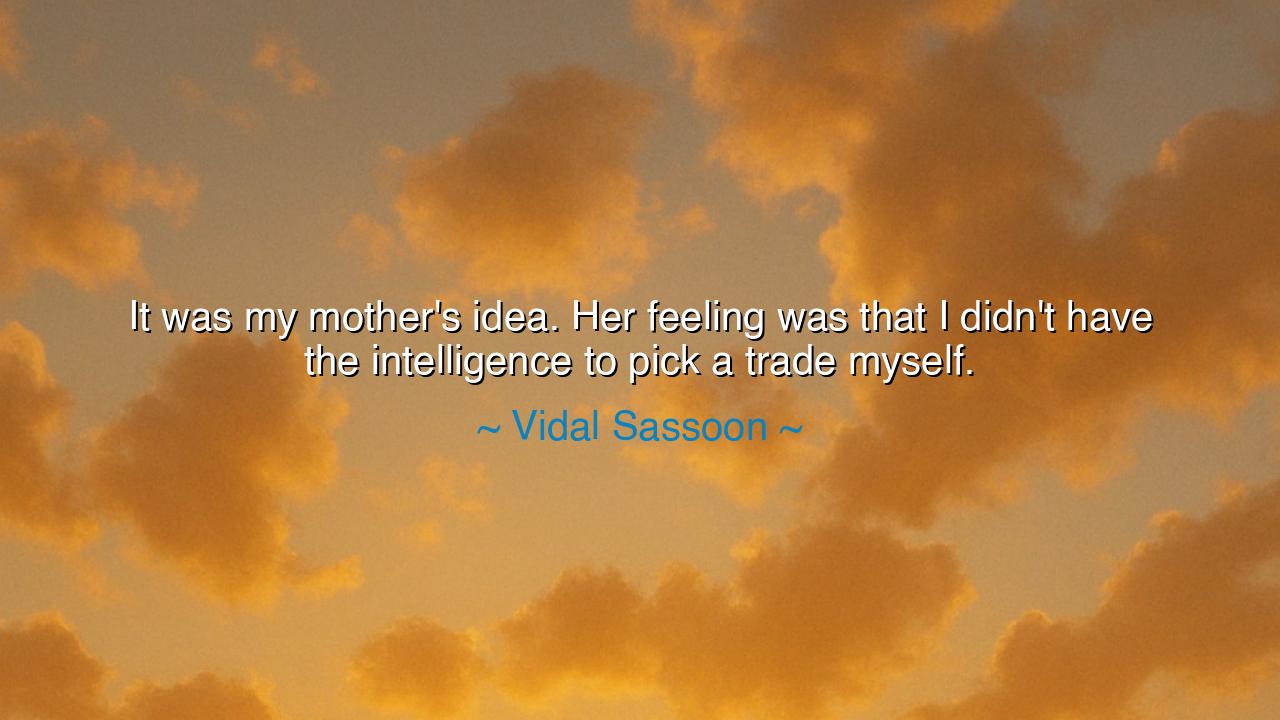
It was my mother's idea. Her feeling was that I didn't have the
It was my mother's idea. Her feeling was that I didn't have the intelligence to pick a trade myself.






The words of Vidal Sassoon, spoken with both humility and a quiet smile, carry within them a lesson wrapped in irony and truth: “It was my mother’s idea. Her feeling was that I didn’t have the intelligence to pick a trade myself.” Beneath their simplicity lies a story of destiny’s strange humor — how doubt and guidance, when intertwined, can give birth to greatness. For Sassoon, who would one day transform the world of hair design and redefine beauty itself, these words recall the unlikely beginning of a life shaped by both a mother’s practicality and a son’s hidden genius. In his mother’s skepticism, there was an unintended gift — a direction that led him toward the very craft through which he would rise from poverty to artistry.
Vidal Sassoon, born in 1928 to a poor Jewish family in London’s East End, knew hardship from the beginning. His father left when he was young, and his mother worked tirelessly to keep the family afloat. In those days, opportunity was a scarce luxury, and dreams were often sacrificed for survival. When his mother sent him to apprentice as a hairdresser, it was not a grand vision of success that guided her, but simple realism — a belief that her son might at least make a living with his hands if not with his mind. Yet fate, ever the master of paradox, often hides its treasures in humble beginnings. What began as an act of doubt became the very path through which Sassoon’s creativity, discipline, and intelligence would shine brighter than anyone could have foreseen.
There is ancient wisdom in this story — the wisdom that life’s direction is not always born from our own choosing. Many of the world’s great souls have walked paths first chosen for them by others, only to discover that the hand of destiny worked quietly through circumstance. Consider Leonardo da Vinci, whose apprenticeship in Verrocchio’s workshop was arranged not by his own will, but by necessity. Yet within those walls, mixing paints and grinding pigments, Leonardo’s genius awoke. The same truth pulses through Sassoon’s tale: that what may appear as limitation can, through devotion, reveal itself as destiny. His mother may have doubted his intellect, but she unknowingly placed him at the gates of his life’s calling.
And yet, Sassoon’s words are not bitter. They are filled with gratitude and humor, for he understood the irony of fate. The boy whose mother thought him too simple to choose a trade became a man who revolutionized an entire profession — elevating hairdressing from a service to an art. Through discipline and innovation, he brought structure, geometry, and elegance into design, creating styles that would define an era. What his mother saw as a safe trade became the medium through which he expressed vision and intelligence of the highest order. Thus, Sassoon’s quote becomes not a lament, but a celebration of transformation — a testament to how doubt, when met with perseverance, can give birth to triumph.
There is also a universal truth here about the power of humility. Sassoon did not begin his journey with grand expectations or pride. He began with the willingness to learn, to work, and to master a craft others might have dismissed as trivial. The ancients often taught that greatness is not found in the nature of one’s task, but in the spirit with which it is performed. The farmer who tills with devotion, the artisan who shapes with care, the teacher who instructs with heart — all stand equal in the eyes of wisdom. Sassoon’s genius was not that he found an extraordinary trade, but that he made the ordinary extraordinary through excellence.
Consider the story of Michelangelo, who once said, “If people knew how hard I worked to get my mastery, it wouldn’t seem so wonderful at all.” Like Sassoon, he began as an apprentice, chipping marble under another’s instruction. Yet through labor and love, he carved beauty so profound that it seemed divine. Both men remind us that mastery begins with surrender — the surrender of pride, of complaint, and of the illusion that greatness comes only from choice. Sometimes the divine chooses for us; it is our duty to make meaning from what we are given.
Thus, the lesson of Vidal Sassoon’s words is both tender and timeless: never despise humble beginnings, and never let another’s doubt define your limits. Even when others see smallness in you, respond not with anger, but with excellence. For in every act of diligence lies the seed of destiny. Let your work, whatever it may be, bear the signature of your heart and intellect. The world has seen many born into privilege who wasted their promise, and many born into struggle who turned adversity into art. Sassoon belonged to the latter — one who proved that intelligence is not measured by what you are given, but by what you create from it.
So, dear listener, remember this: the world may not always see your potential, and even those who love you may underestimate your power. But if you meet life’s tasks with passion and purpose, your actions will speak the truth your beginnings could not. Take every path, chosen or imposed, and make it your own. For even a mother’s doubt, when met with perseverance, can lead to greatness — and the hands once guided by another’s will may one day shape the world itself.






AAdministratorAdministrator
Welcome, honored guests. Please leave a comment, we will respond soon